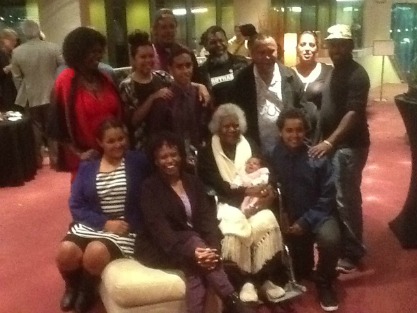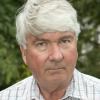 What an honour it is for a non-Indigenous Australian to be asked to respond to Les Malezer who has just delivered the 5th Mabo Oration. I join you in acknowledging the traditional owners of this place which is now home to the Queensland Performing Arts Centre. Celebrating the 21st birthday of the High Court's Mabo decision and remembering Eddie's passing just over 21 years ago, I greet Eddie's wife Bonita and their children Jessie, Eddie Junior, Celuia, and the many grandchildren with us today including the 39th, 3 week old Isabella.
What an honour it is for a non-Indigenous Australian to be asked to respond to Les Malezer who has just delivered the 5th Mabo Oration. I join you in acknowledging the traditional owners of this place which is now home to the Queensland Performing Arts Centre. Celebrating the 21st birthday of the High Court's Mabo decision and remembering Eddie's passing just over 21 years ago, I greet Eddie's wife Bonita and their children Jessie, Eddie Junior, Celuia, and the many grandchildren with us today including the 39th, 3 week old Isabella.
To our orator, congratulations Les on your recent re-election as the Co-Chair of the National Congress of Australia's First Peoples.
Eddie would be well pleased at the passion, vision and competence displayed here today by Shannon Ruska with his inspiring welcome to country and by the wonderful music and lyrics of Thelma Plum accompanied by Andrew Lowden. The talents of Indigenous Australia are becoming increasingly available, accessible and appreciated by all Australians.
Les has provided us with a very rich, dense oration which Eddie would have welcomed, encouraging the conversation to continue, animated by the contest of ideas. I first met Eddie and Les half a life time ago, in 1982, the year of the Commonwealth Games here in Brisbane. The Brisbane streets resounded with the cry to Sir Joh Bjelke-Petersen's Government, 'What do we want?' 'Land Rights'. 'When do we want it?' 'Now.' Les was here at FAIRA, the Foundation for Aboriginal and Islander Research Action. Eddie was in Townsville. I chatted to him after a land rights conference there. He told me that even if Sir Richard Blackburn got it right in the 1971 Milirpuum v Nabalco decision, that was not the end of the matter on land rights. Blackburn said that the common law did not recognise communal native title. But Eddie pointed out that Torres Strait Islanders didn't maintain just communal interests in land; they held individual title to their homes and vegetable gardens. Blackburn said that the British crown asserting sovereignty over the Australian continent did not recognise any ongoing native title. But Eddie pointed out that the Queensland Government and Parliament had long maintained courts and processes for determining Torres Strait Island land disputes. It took another ten years for 6 of the 7 High Court judges to write hundreds of pages agreeing with Eddie. He put it much more simply. He was right and he stuck to his convictions.
Responding to Les's Oration, I want to focus on just one of the many observations he makes: The Declaration on the Rights of Indigenous Peoples 'is about equality, and redress of racial discrimination, and not about the creation of new human rights for Indigenous Peoples'. On the verge of considering constitutional reform and recognition of Indigenous Peoples in our Constitution, we as a nation are still wrestling with these concepts. How do we best ensure equality for all Australians, including Aborigines and Torres Strait Islanders? How do we best provide redress from past and ongoing racial discrimination? Can we do this without creating new human rights for Indigenous peoples?
Les asks at the conclusion of his oration: 'What is the political status of our peoples?' He says, 'Yes there is an obvious and simple response: 'The Aboriginal and Torres Strait Islander person is a citizen of Australia and has the same political status as any Australian.' But he has never accepted that answer and believes 'it cannot be the answer for as long as no agreement is reached with the Aboriginal and Torres Strait Islander peoples.' What then are the matters on which we still need to reach agreement?
None of these questions can be answered well unless we take account of our history. Two weeks ago, I was sitting alone on the shoreline at Urangan at the entrance to the vast Hervey Bay. 150 years ago to that very day, a migrant ship, the David McIver, entered Hervey Bay carrying 404 immigrants, there having been only one death but also 9 births on the 107 day voyage from Liverpool. Included in the passenger list were Annie Brennan, my great great grandmother, a young widow of 40 years with her 5 children, one of whom Martin was to become my great grandfather.

Hervey Bay is a very expansive but shallow bay sheltered from the Pacific Ocean by the majestic Fraser Island. On 6 July 1863, the David McIver spent the day searching for a channel until it was anchored in 4 fathoms of water. Some of the crew then got into a small boat and made for the shore at Urangan close to where I was sitting 150 years later. They came ashore and found two Aborigines. I presume they were males. Those two Aboriginal men then without protest accompanied the crew in the boat and showed the crew the way to Captain Jeffrey's Admiralty Survey Camp. The David McIver was only the second migrant ship ever to come into Hervey Bay and here were two Aborigines happy to extend a helping hand to complete strangers who must have looked very strange indeed. One Aboriginal was then commissioned to send word to Maryborough 40 kilometres away. That Aboriginal walked and ran all through the night to bring word of these new arrivals. A pilot was then dispatched. Within two days, a steamer named Queensland arrived, towed the David McIver to White Cliff on Fraser Island, and then received the disembarking passengers to transport them up the Mary River to the port of Maryborough where they arrived on 9 July 1863.
If my mob were to arrive by boat today uninvited, they would be sent to Papua New Guinea. 150 years ago, the traditional owners helped my ancestors and their fellow passengers to find safe anchorage so that they might settle here permanently calling Australia home. They extended the hand of peace and welcomed the stranger. Many on the David McIver were eligible for land grants from the newly established Queensland Government. That was the lure for their coming to the other side of the world rather than the United States. It's a matter of some pride for me that one of Annie Brennan's great grandchildren, my father, was one of the judges who just 21 years ago in the Mabo Case said that Aborigines had always owned the land which had been subject to those gratuitous land grants.
The expert panel which has proposed a way forward on constitutional recognition has highlighted that the Commonwealth's law-making power theoretically could be exercised in a manner adverse to Aboriginal and Torres Strait Islander peoples. The Panel has suggested a special preamble for the newly proposed Section 51A of the Constitution 'acknowledging the need to secure the advancement of Aboriginal and Torres Strait Islander peoples'. I am one of those contemporary Australians who flinches a little at the word 'advancement'. It is a very 1970s word. The government will be wanting to 'advance' Aborigines from where to what. As I hear Les speaking of equality, non-discrimination and the need for agreement, I do not detect any yearning for advancement from a backward to a forward state. Those worried that the Commonwealth Parliament might use any 'race power' to act against the interests of Aborigines might want to consider whether the legislative power should relate to objects rather than people. For example, the Commonwealth Parliament could be given the power to make laws 'with respect to Aboriginal and Torres Strait Islander land rights, heritage protection, languages and cultures'.
Last month, the High Court of Australia delivered the final judgment on the long running dispute about restrictive grog laws applied to Palm Island. In Maloney v The Queen, I think the High Court reached the right conclusion upholding the validity of the laws. But with all respect, I think they got there following the wrong route, using a now outdated way of addressing questions of equality, non-discrimination and agreement. Both the Queensland and Commonwealth Governments submitted to the High Court that the laws were not racially discriminatory because they were targeted at communities with a demonstrated need for restrictive laws for the maintenance of peace and security in those communities. The High Court received evidence that the 'harm levels in the communities subject to regulatory amendment range from 7.5 times to 13.6 times Queensland's expected number of hospital admissions for assault; and from 11.2 times to 24.6 times the expected number of reported offences against the person.' All but one of the judges rejected the racially non-discriminatory approach, preferring to classify the laws as a special measure 'taken for the sole purpose of securing adequate advancement' of a disadvantaged racial group. This gave rise to claims in the national media by some Aboriginal residents and their elected representatives that they had not been adequately consulted about what was necessary for their 'advancement'.
There are two great lines in the judgment of one of the newest High Court justices, Justice Gageler. He said, 'Geography was used as a proxy for race.' He went on to say, 'Racial targeting is not negated by some persons of other races being caught in the net.' But then he joined the majority claiming that such discriminatory laws were special measures.
In one of the first racial discrimination cases, Justice Brennan in Gerhardy v Brown when asking whether a measure is a special measure being 'for the sole purpose of securing adequate advancement of the beneficiaries in order that they may enjoy and exercise equally with others human rights and fundamental freedoms' said, 'The wishes of the beneficiaries for the measure are of great importance (perhaps essential) in determining whether a measure is taken for the purpose of securing their advancement.' In the recent Maloney decision, Chief Justice French said that you could not insist that consultation be a definitional element of a 'special measure'. He went on to say:
Nor can such a requirement be imported into a text which will not bear it by the subsequent opinions of expert bodies, however distinguished. That being said, it should be accepted, as a matter of common sense, that prior consultation with an affected community and its substantial acceptance of a proposed special measure is likely to be essential to the practical implementation of that measure. That is particularly so where, as in this case, the measure said to be a 'special measure' involves the imposition on the affected community of a restriction on some aspect of the freedoms otherwise enjoyed by its members. It can also be accepted, as the appellant submitted, that in the absence of genuine consultation with those to be affected by a special measure, it may be open to a court to conclude that the measure is not reasonably capable of being appropriate and adapted for the sole purpose it purports to serve.
I was very interested to read Michael Mansell's letter to The Australian on 12 July 2013 carrying the headline, 'Constitution change must have Aboriginal agreement'. He wrote:
Aborigines will welcome the renewed commitments by Prime Minister Kevin Rudd and Opposition Leader Tony Abbott to constitutional recognition of indigenous peoples.
It is important that whatever words are used, Aboriginal people agree with them. The judicial father of the Mabo judgment, Gerard Brennan, said that it is not for politicians to unilaterally declare an action is for the benefit of the Aboriginal people if Aborigines don't want it.
Those who gain the benefit must want it and not have an unwanted material benefit foisted on them.
Putting self-determination in the Constitution would at least provide a binding framework guide for progressive policy of enormous educational value to the nation and even better, designated seats in parliaments as the Maori in New Zealand have had for 100 years.
Recently I was asked by a few of the New South Wales land councils to join retired Justice Trevor Morling reviewing the operation of the New South Wales land rights legislation. We found that the big challenge nowadays is finding the balance between security and utility of Aboriginal lands. Everyone is agreed on the need to maintain the patrimony of Aboriginal land holdings for future generations. But that patrimony needs to be useful for contemporary Aborigines who at times will want to sell, mortgage and lease some lands so that they might enjoy the benefits of their overall land holdings. Once again the challenge is finding how best to ensure equality, non-discrimination and agreement.
Last week, the Aborigines at Yirrkala held ceremonies commemorating the 50th anniversary of the bark petitions presented to the Australian Parliament on 14 August 1963. Back in November 1935, the Reverend Wilbur Chaseling, a Methodist Missionary arrived at Yirrkala with his family and fellow missionaries. They were the first Europeans to settle in that part of the world. In the early 1960s, a foreign corporation wanted to come and mine the Aboriginal lands there at Yirrkala. The missionaries worked closely with the Aboriginal leaders deciding to petition the Australian parliament asking to be consulted before there was any invasion or interference with their hunting and traditional places. In a graceful understatement, they told Parliament, 'That the people of this area fear that their needs and interests will be completely ignored as they have been ignored in the past, and they fear that the fate which has overtaken the Larrakeah tribe will overtake them.' The Larrakeah were the traditional owners of Darwin and the elders from Yirrkala had seen the social devastation caused the Larrakeah people living as long grasses on the outskirts of Darwin. Eventually the people were heard. They lost their case before Sir Richard Blackburn in 1971. Thanks to Eddie Mabo, we have now been provided with a surer legal foundation for extending equality, non-discrimination and agreement to all Australians, including our First Peoples. Today's oration provides pointers for the ongoing dialogue we need to complete the task. Let's do it together in the same spirit displayed by those who met on the shore at Urangan 150 years ago.
 Fr Frank Brennan SJ is professor of law at Australian Catholic University, and adjunct professor at the College of Law and the National Centre for Indigenous Studies, Australian National University.' Eddie Mabo's legacy of equality, non-discrimination and agreement' is from Fr Brennan's Mabo Oration Response at the Playhouse, Queensland Performing Arts Centre, 21 July 2013.
Fr Frank Brennan SJ is professor of law at Australian Catholic University, and adjunct professor at the College of Law and the National Centre for Indigenous Studies, Australian National University.' Eddie Mabo's legacy of equality, non-discrimination and agreement' is from Fr Brennan's Mabo Oration Response at the Playhouse, Queensland Performing Arts Centre, 21 July 2013.
Pictured: Bonita Mabo with some of Eddie's descendants.